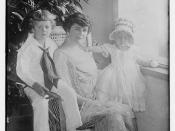At the turn of the century when discussing the subject of war there was only one Latin ideal which could come to mind: " Dulce et decorum est, pro patria mori"; it is sweet and proper to die for one's country. Through the graphic depictions of Charles Harrison's Generals Die in Bed and Ernest Hemmingway's Farewell to Arms, world society is introduced to the horrors of modern day warfare in a way that has yet to be forgotten. Both Fredric Henry and the characters of Generals Die in Bed, despite the many hardships they face, are still able to function as human beings by displaying characteristics of friendship within the ranks, feelings of love, and sorrow which comes with the death of a loved one back home, or the death of a fellow soldier. Despite all this the human sprit lives on.
From the opening chapter in Montreal, to the graphic portrayal of battle, the characters of Generals Die in Bed, form friendships on the basis that only the men in the trenches next to them will ever be able to relate to the agony of war.
Comradeship and esprit de corp, according to the narrator, are merely words that are used by reporters. For the "grunts" in the trenches life was much simpler; "... a belly full to eat, enough smokes to last the night, and the trust of the guy next to you", Harrison explains. Their friendship is tested when a fight breaks out between Cleary and Broadbent. When bread is being distributed by Cleary, Broadbent suspects that his piece is smaller than the rest and immediately goes after Cleary. The other men separate the two "snarling animals" as a bombardment begins. Harrison shows us that like a family, they fight over what may seem like...


